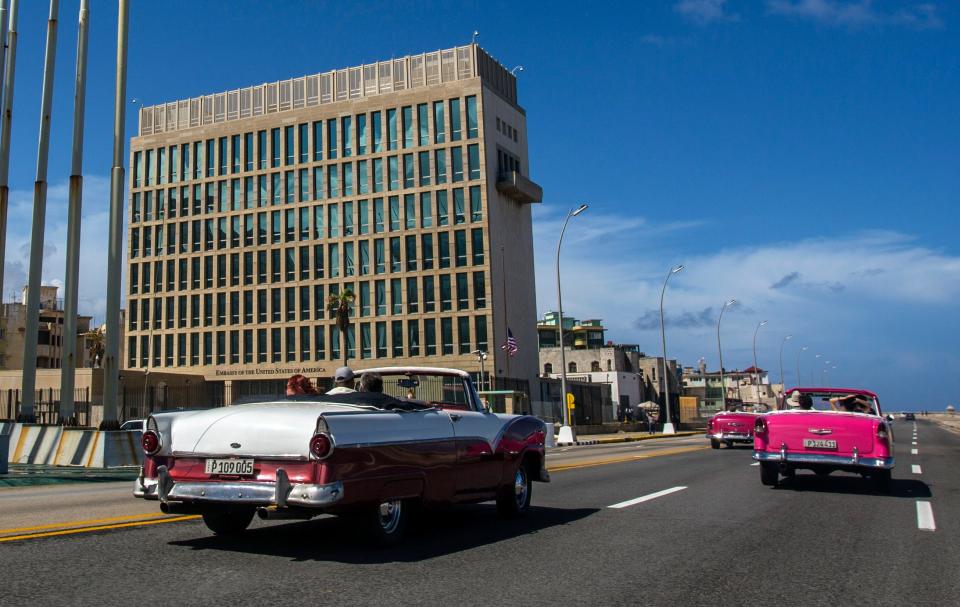US intel community concludes it's 'very unlikely' foreign adversaries caused 'Havana Syndrome'
After a six-year investigation, the U.S. intelligence community said Wednesday it's "very unlikely" that a foreign adversary – or secret weapon – caused the rash of auditory and other physical symptoms known as "Havana Syndrome" among hundreds of U.S. employees, mostly overseas.
The formal "Intelligence Community Assessment," according to a declassified version of the report, addresses the theory that U.S. intelligence and diplomatic workers came down with sudden and often debilitating illnesses as the result of targeted energy waves or some other clandestine technology developed by Cuba, Russia, China or another adversary.
It contradicts, at least in part, a preliminary finding by U.S. intelligence officials in February 2022 that a high-tech device shooting pulsed electromagnetic energy or ultrasound waves could be causing at least some of the mysterious and debilitating medical symptoms sickening U.S. spies and diplomats working overseas.
CIA Director William J. Burns and Avril Haines, the director of national intelligence overseeing all 18 U.S. intel agencies, both sought to reassure those who have reported symptoms linked to Havana Syndrome that they are taking their claims seriously. A senior intelligence official said Wednesday that the current total stands at 1,500 or more cases from around the world, including some reported in recent months.
Burns said the CIA had applied its "very best operational, analytic, and technical tradecraft to what is one of the largest and most intensive investigations in the Agency's history."
And, he added, "I want to be absolutely clear: these findings do not call into question the experiences and real health issues that U.S. government personnel and their family members – including CIA's own officers – have reported while serving our country," Burns said in a statement.
More: US spies likely being targeted by energy waves in some 'Havana Syndrome' cases, panel says

What's new in the assessment?
In a message to intelligence officials around the world, Haines said the assessment builds on an interim one last year by the intelligence community, or IC in government parlance, that came to essentially the same conclusion but said more work needed to be done to say so definitely.
"Based on the latest IC-wide effort... I can share with you that most IC agencies have now concluded that it is 'very unlikely' a foreign adversary is responsible for the reported AHls," Haines said, in reference to Anomalous Health Incidents, the formal U.S. government catch-all term for the many reported symptoms of Havana Syndrome.
The intel assessment focused on three areas of inquiry: whether foreign adversaries were to blame, if specific "deliberate mechanisms" were the cause and whether a medical analysis of the cases could help determine why so many people were reporting symptoms. In each of those areas, the majority of the seven intelligence agencies participating in the investigation agreed with the conclusions with "high confidence" while others had only "moderate" or "low" confidence.
The new intel assessment drilled down on the initial cases reported by U.S. officials in Cuba from 2016 to 2018, and found that they – and many others that followed – were "not borne out by subsequent medical and technical analysis," Haines said.
The investigation will continue, Haines noted, as U.S. intelligence agencies "have varying confidence levels because we still have gaps given the challenges collecting on foreign adversaries – as we do on many issues involving them." A separate However, a team of experts at the Pentagon is continuing to investigate the matter.
But without any specific culprit, technology or "unique syndrome" to blame, she added, ''IC agencies assess that symptoms reported by U.S. personnel were probably the result of factors that did not involve a foreign adversary, such as preexisting conditions, conventional illnesses, and environmental factors."
More: CIA rules out hostile foreign power behind medical symptoms known as 'Havana Syndrome'

A more blunt assessment
In a briefing with reporters, two senior U.S. intelligence officials were more blunt, saying investigators looked into every possible scenario, including terrorists, disgruntled U.S. officials and even aliens before coming to the conclusion that no specific entity or technology caused the wide array of symptoms and injuries that were reported in 96 countries beginning in Havana, Cuba in late 2016.
The two officials said the investigation that led to the assessment, led by seven U.S. intelligence agencies they wouldn't identify, was one of the broadest and most intensive ever conducted by the U.S. government. Investigators, they said, literally followed suspected foreign agents around the world for months at a time and even backgrounded their families and workplaces in an effort to find evidence tying the cases to a particular entity or technology.
"There were leads," one of them said. "But every time you followed them up, they dissipated. ... There's nothing there."
What is Havana Syndrome?
The term "Havana Syndrome" was coined after an illness struck people working at the U.S. Embassy in Havana beginning in 2016. Diplomats and staffers reported experiencing severe headaches, ringing in their ears, hearing loss, dizziness, loss of balance and other neurological symptoms.
Many of those who experienced Havana Syndrome reported hearing a loud noise or feeling a sensation of intense pressure or vibration in their head, and pain in the ear or in the head, according to a report by the National Academies of Sciences.

What's the biggest takeaway from the report?
The senior intelligence officials who briefed reporters tried to walk a fine line between saying the new assessment will stand as the definitive word on the controversial topic, while also leaving the door open to further investigation into what may be causing the cases.
The new findings are sure to generate controversy in Congress, where some lawmakers and other critics already have accused the intelligence community of being too dismissive of the controversy. They cited the wealth of information that has been made public about U.S. spies and other employees having to return home from overseas posts, or even retire, due to documented injuries.
“We will seek to ensure the review was conducted with the highest degree of analytical rigor and that it considered all the available intelligence and perspectives, documenting all substantial differences in analysis," said Rep. Mike Turner, R-Ohio, and Rep. Jim Himes of Connecticut, the ranking Democrat on the House Intelligence Committee, in a joint statement. They said the committee "will take a skeptical approach and test the assumptions of the IC, as our oversight requires."
Victims groups also immediately pushed back on the findings. Lawyer Mark Zaid, who represents two dozen Havana syndrome sufferers, said that the latest assessment "lacks transparency, and we continue to question the accuracy of the alleged findings."
"What is most important to remember is that there are actual victims and (the U.S. government) must ensure their health & well-being are addressed – without question," Zaid said. "We will continue the fight."
This article originally appeared on USA TODAY: 'Havana Syndrome' unlikely caused by foreign adversaries, report says

